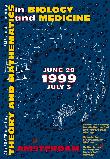
Day sessions
There are 6 day sessions.- Non-Linear Population Dynamics
- Epidemiology of Infectious Diseases
- Sequencing, Folding and Molecular Structure
- Evolution, Game Theory and Adaptive Dynamics
- Computational Neuroscience
- Immunology and Within-Host Dynamics of Pathogens
1. Non-Linear Population Dynamics
Organisers:
M. Kirkilonis (Utrecht University, The Netherlands)M.P. Boer (Centre for Biometry Wageningen (DLO), The Netherlands)
Invited speakers:
1. D. Rand (University of Warwick, United Kingdom)2. H.L. Smith (Arizona State University, USA)
Abstract:
Mathematical population dynamics is one of the oldest disciplines of theoretical biology, and has become a major subject in the study of ecological and other related problems. Different biological situations are described by a wide range of models, mathematically formulated as non-linear dynamical systems. Solutions of such systems show a rich variety of behaviour hinting at the possible complexity of biological interaction between individuals, populations and their environment.2. Epidemiology of Infectious Diseases
Organisers:
M. Kretzschmar (National Institute of Public Health and the Environment (RIVM), The Netherlands)J.A.P. Heesterbeek (Centre for Biometry Wageningen (DLO), The Netherlands)
Invited speakers:
1. K. Dietz (Tuebingen University, Germany)2. V. Andreasen (Roskilde University, Denmark)
Abstract:
This session focuses on the mathematical modelling of the spread of infectious diseases in human and animal populations. In particular, we invite talks dealing with the effects of contact patterns, stochastic phenomena, multiple hosts and evolutionary aspects of infectious diseases.3. Sequencing, Folding and Molecular Structure
Organisers:
J.J.M. Riethoven (European Bioinformatics Institute, United Kingdom)F.H.D. van Batenburg (Leiden University, the Netherlands)
Invited speakers:
1. M.S. Waterman (University of Southern California, USA)2. P.G. Higgs (University of Manchester, United Kingdom)
Abstract:
Focusing on the more theoretical and mathematical issues and advances in this exciting field of bioinformatics, this one-day session will include topics on DNA fragment assembly, sequence/protein comparison, sequence analysis, secondary and tertiary structure (prediction) of macro- molecules such as RNA, DNA and proteins, sequence analysis, and gene prediction.4. Evolution, Game Theory and Adaptive Dynamics
Organisers:
F.J.Weissing (Groningen University, The Netherlands)C.G.F. de Kovel (Utrecht University, The Netherlands)
Invited speakers:
1. J.A.J. Metz (Leiden University, the Netherlands)2. Peter Hammerstein (Berlin University, Germany)
Abstract:
The last three decades have revolutionized the way we think about evolution at various levels of organisation. New theoretical ideas on topics as molecular evolution, genetic conflicts, frequency- and density-dependent selection, sexual selection, spatial interactions, or non-equilibrium dynamics have played a major role in this process. Still there are major challenges as, for example, the integration of genetic and phenotypic approaches to natural selection, or the incorporation of developmental genetics into evolutionary theory. Several of these topics will be addressed in this session. We will also consider the empirical relevance of present-day models and discuss whether new modelling approaches are required to improve the testability of evolutionary theories.5. Computational Neuroscience
Organisers:
J. van Pelt (Netherlands Institute for Brain Research, The Netherlands)A. van Ooyen (Netherlands Institute for Brain Research, The Netherlands)
Invited speakers:
1. D. Willshaw (University of Edinburgh, United Kingdom)2. I. Segev (Hebrew University, Jerusalem, Israel)
Abstract:
Understanding the brain in health and disease is perhaps the greatest challenge for science in the next century. Because the brain is an extremely complex and organised system from the molecular up to the behavioural level, this goal can not be achieved without modelling and computational approaches. This Session aims at emphasizing this role of Mathematical Modelling and Computer Simulation in Neuroscience. Participants are invited to present progress in understanding the structure, function and development the brain.6. Immunology and Within-Host Dynamics of Pathogens
Organisers:
R. Mehr (Princeton University, USA)R.J. de Boer (University of Utrecht,The Netherlands)
Invited speakers:
1. Lee Segel (Weizmann Institute, Israel)2. T.B. Kepler (North Carolina State University, USA)